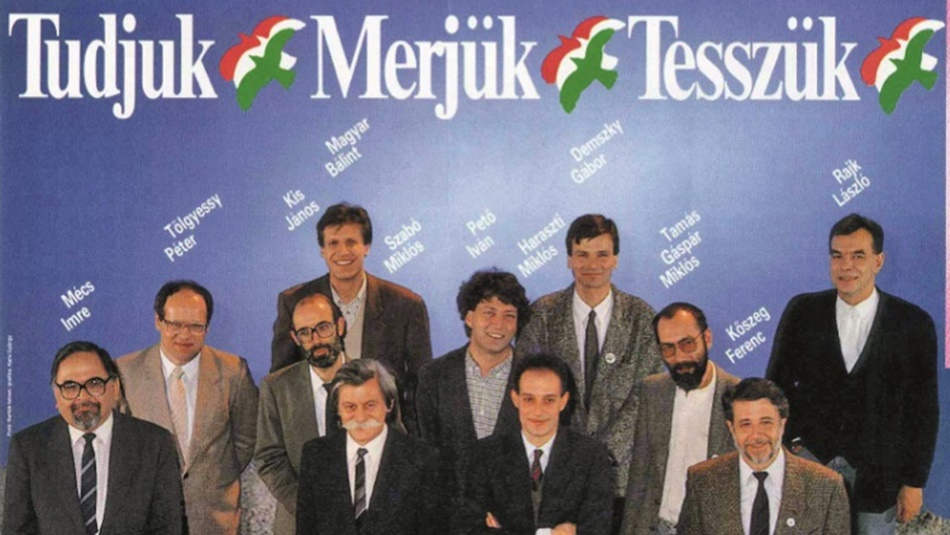I would like to turn to the opposition parties: while the party-state elite achieved more or less what they wanted during the regime change, the same can only be partially said about the opposition parties.
Although the SZDSZ did not seriously consider breaking with the party-state elite and holding them accountable from the start, the national conservative parties started from the assumption that the new system, democracy, must be cleansed of the elite of the old order , because otherwise there will be no moral renewal, no real caesura between dictatorship and democracy, and we will not get rid of a party-state mentality, which will also in the future hinder the assertion of national interests and national sovereignty, the creation of a national minimum between the current government and the opposition. (The goal was formulated in 1990: "Spring Cleaning!")
I am convinced that the opposition - respect for the exception - was too involved in bargaining with the party-state elite, in other words, it looked too much upwards and not downwards, towards society. Elite negotiated with elite, and in the meantime they neglected the strength that was shown on the streets and in the demonstrations.
Because, contrary to all reports to the contrary, the society was behind the regime change, which was proved by the spectacular demonstrations in 1988 and 1989, for example on March 15, 1988 and March 15, 1989. As a personal participant in these events, I can confidently say that a significant and active part of society was behind democratization and wanted real accountability, historical justice, and lustration. If these masses receive positive feedback from the opposition parties, they would have been able to put further social, bottom-up pressure on the party-state power, preventing the Gyulá Horns and their colleagues from forcing the MDF and the incoming Antall government into bad compromises. . As happened, for example, in East Germany in Dresden, Berlin, Leipzig, Wenceslas Square in the Czech Republic and in the Baltic states.
Unfortunately, however, the leaders of the opposition parties made themselves believe that from the spring of 1989 only they had to deal with the regime change and not the masses. In my opinion, this was a historical mistake, the maintenance of a less fortunate tradition in which civil society and the will of the people are not given a hand during political processes. Elemér Hankiss wrote about this in 1990: "In 1989, there was still an opportunity to transform the radical reform process directed from above into a peaceful revolution that moves society as a whole. We missed this opportunity, and now we look with some envy at the triumphantly progressing, not so "gentle" revolution of our northern neighbors."
Although 1956 showed that the people are capable of miracles, and they would have been able to do so in 1989 as well, if, for example, the opposition parties stood at the head of the masses. This did not happen, but the opposite, and therefore the Hungarian regime change did not become a social revolution, but remained an elite revolution, or rather an elite agreement - with mixed results. ( József Antall's bon mot "they would have liked to make a revolution!" is a highly controversial statement.) Well, the era that began after 2010, which can rightly be called the second regime change, overturned this paradigm.
My conclusion is that, among other things, there was no lustration, historical justice and elite exchange in Hungary after 1990, because the dominant opposition elite groups - MDF and SZDSZ - in one way or another, got too close to the party-state elite, resulting in bad agreements and bad deals may have been made in the background. And it follows directly from all of this that the balance of the Antall government is strongly positive: it built up parliamentary democracy and the rule of law, the institutional system of democracy was created, but it did not build up post-communism and let the people of the dictatorship stay with us and continue to destroy the political atmosphere. They did not do historical justice and lustration, although they had the means to do so.
To sum up, among the Hungarian political actors, the party-state elite in many respects successfully planned and managed the transition until the first free elections , and after that it was able to prevent - of course it was not only up to them - that the institutional change was followed by personnel changes and that the new system was cleaned up. Among the opposition parties , the globalist-cosmopolitan SZDSZ, whose anti-communism was a lie from the beginning, achieved its goals by limiting the power of the Antall government with the help of international-global forces, and in 1994 came to power with the post-communists. Mária Schmidt wrote the following about the responsibility of the SZDSZ: "The left-wing liberal intellectual elite and their political representation, the SZDSZ, are largely responsible for the fact that we missed the historic chance for the country's moral renewal. Using their moral capital acquired in the democratic opposition, they released the successor party of the MSZMP from quarantine after barely two years, and after their overwhelming election victory, they undertook co-governance.
The national-conservative parties and the Antall government could not come close to their set goals, they were forced to make too many compromises and this limited their effectiveness; in addition to the lack of lustration, they were also unable to stop the process of spontaneous privatization stealing national wealth. Their good intentions are indisputable, but so is their excessive good faith and helplessness.
And in the end, the actor that got outside the coastline is clearly civil society and the will of the people. He didn't really get help, he didn't achieve his goals, he actually just became a spectator of the regime change - but not necessarily through his own fault. I am convinced that one of the keys to the success of the second regime change is that the will of the people will finally be given a hand in the new era - and the signs of this are already clear.
Author: Tamás Fricz, political scientist
The entire series can be read here: Tamás Fricz – Failure to account













